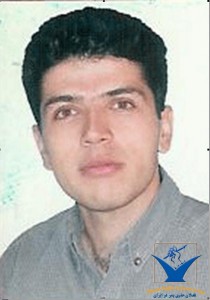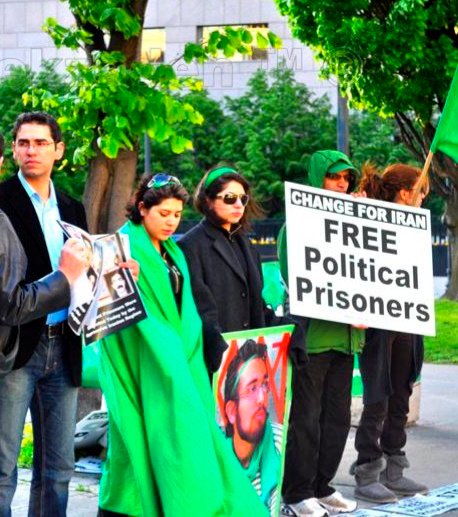The Latest from Iran (11 May): Opposition Surfaces
 Tuesday, May 11, 2010 at 17:10
Tuesday, May 11, 2010 at 17:10  2220 GMT: Political Prisoner Watch. A Tehran appeals court has upheld the guilty verdict against Hamzeh Karami, manager of the Jomhouriyat website. Karami will serve one year in prison for propaganda against the system and 10 years in prison and permanent dismissal from government services for embezzlement.
2220 GMT: Political Prisoner Watch. A Tehran appeals court has upheld the guilty verdict against Hamzeh Karami, manager of the Jomhouriyat website. Karami will serve one year in prison for propaganda against the system and 10 years in prison and permanent dismissal from government services for embezzlement.Karami was acquitted of collaboration and collusion with to disrupt national security, which would have added five years to his jail term.
NEW Iran Document: Maziar Bahari’s Response to His 13-Year (and 74-Lash) Sentence
NEW Iran Special: A Renewal of Protest for 12 June?
UPDATED Iran Video: Protest Against Ahmadinejad at Shahid Beheshti University (10 May)
Iran Background Video: Protest in Kurdistan Over Political Prisoners
Latest from Iran (10 May): Will the Executions Matter?
1905 GMT: Behave Yourselves! Minister of Interior Mostafa Mohammad Najjar has said police will deal firmly with those who violate socially accepted standards, including disregard for the Islamic dress code: “As the president has ordered and the people have demanded, police will take firm action against those who break the norms."
1555 GMT: Getting over the MediaFails. I was considering an entry about a series of media trainwrecks in Iran coverage --- Bronze Medal to CNN's Rick Sanchez, as the broadcaster decided to notice opposition because of yesterday's 8-minute video from the Shahid Beheshti University protest, for his statement that "five demonstrators died" on Sunday; Silver Medal to Reuters for simply dressing up the Islamic Republic News Agency press release on Sunday's executions; Gold Medal to The Huffington Post for skipping Iran coverage in favour of a food-fight between Flynt and Hillary Mann Leverett and their critics.
But why spend the time and energy on failures? Instead, we have posted the response of journalist Maziar Bahari to his 13-year, 74-lash sentence by an Iranian court.
1515 GMT: The Executions. Zahra Rahnavard has issued a statement denouncing Sunday's hangings as a demonstration of the "extreme provocative and violent rule of the regime".
1345 GMT: Promise of the Day. First Vice President Mohammad Reza Rahimi, accused of corruption by leading members of Parliament, has reportedly said in a government meeting: "If one of these frauds is confirmed, I'll cut off my hand."
1335 GMT: Rafsanjani Watch. Is former President Hashemi Rafsanjani, in the run-up to 12 June, coming off the political fence? Speaking to reformist youth, Rafsanjani reporting said that the imprisonment of “concerned critics” of the government will enhance people’s awareness of the situation and stressed that “silence” in the face of political issues is unacceptable.
Rafsanjani, according to Mir Hossein Mousavi's website Kalemeh, said that arrests have made a significant number of people “more persistent” and added, “Do not lose heart!.....When you enter political activism, you should not think that the equations are simple and the matters will be resolved with a few demonstrations.”
1332 GMT: The Executions. Human Rights Activists News Agency has posted a report with pictures and video of a demonstration in Washington DC against the hanging of 5 Iranians on Sunday. The National Iranian American Council has issued a statement condemning the executions.
Pictures have also emerged of a protest in Iraq's Sulaimaniya.
1330 GMT: Sniping at Ahmadinejad. In another show of defiance, the Iranian Parliament has pronounced that 11 rules of implementation of the Ahmadinejad Government, covering areas such as money laundering and budget reform, are illegal.
1320 GMT: Khamenei's Man Attacks. The Supreme Leader's vice-deputy to the Revolutionary Guard, Hojetoleslam Muhammad Bagher-Zolghadr, has declared that Grand Ayatollah Sane'i, a hate figure for many in the regime, wanted to become Ayatollah Khomeini's successor and that former President Hashemi Rafsanjani is seeking "to be a pillar of Revolution".
1315 GMT: Video Game Corner. Rah-e-Sabz, citing the Islamic Republic News Agency, claims that a new computer game, "Fighting Sedition", has been released. It is supposedly based on a fighter aircraft attacking targets that look like opposition figures Mir Hossein Mousavi, Mehdi Karroubi, and Mohammad Khatami.
1154 GMT: Economy Watch. The government has announced that implementation of the Ahmadinejad subsidy cuts will begin on 21 May.
1150 GMT: Political Prisoner Watch. Medical student Maryam Abbasinejad, arrested on 2 May, has been released. It is unknown whether the decision by the authorities is linked to a letter from 60 professors from the Tehran University of Medical Sciences to the university’s president, calling for the freeing of Abbasinejad.
1040 GMT: An EA correspondent, drawing on information from inside Iran, reports that it was not only Shahid Beheshti University students who came out to demonstrate against President Ahmadinejad. The university's lecturers were also present in significant numbers.
0855 GMT: The US Hikers. International media are buzzing about the announcement by Foreign Minister Manouchehr Mottaki that Iran will give visas to the mothers of three US citizens arrested along the Iraqi border last July to visit their children in a Tehran prison.
It is just our speculation, but there may be a connection to Iran's apparent efforts to get a deal, possibly brokered by Turkey and Brazil, on uranium enrichment. There is likely to be more on this later today or tomorrow....
0825 GMT: Panic Stations. Here's the first paragraph ofthis morning's story from The Times of London: "Iran is focused on improving a growing arsenal of ballistic missiles but needs at least four more years to be able to target London and more than a decade to threaten the East Coast of the United States, a leading think-tank [the International Institute for Strategic Studies] said yesterday."
However, that measured conclusion is not nearly dramatic enough for The Times' editors. Their headline? "UK could be target for Tehran missiles ‘in four years’".
0800 GMT: The Oil Squeeze. Reuters reports, from the Iranian newspaper Siyaset-e-Rouz, the statement of Minister of Oil Masoud Mirzakemi that Iran needs $25 billion of investment to develop its oil and gas industry.
0715 GMT: Government Gets Tough on Itself! Khabar Online reports that the Government is to fine officials 1000 Toman (just over $1) for each minute they are late to meetings.
0710 GMT: The Economic Battle. After his venture to New York, President Ahmadinejad finally returned to domestic contests yesterday, declaring over his subsidy cut plan, "I stand to the end for justice and will not be fooled by anyone."
<
0700 GMT: The Executions. Political prisoners in the Gohardasht facility have published a letter of solidarity with those executed on Sunday.
0635 GMT: More Hangings? In the aftermath of Sunday's hanging, The International Campaign for Human Rights in Iran warns that at least sixteen Kurdish detainees and eleven post-election protestors are in danger of unannounced, sudden executions.
0625 GMT: Considering the context of the executions and yesterday's response, an EA reader sends us a discussion in Sweden including Hassan Shariatmadari and Farrokh Negahdar on "Perspectives of the Green Movement".
0620 GMT: Silencing the Families of the Executed. Fereshteh Ghazi reports that the Iranian authorities are refusing to release the bodies of the five Iranians put to death on Sunday to their families, who are waiting in front of Evin Prison. Ghazi claims that the families are being told they must sign an oath that there will be no protests in their towns.
0615 GMT: Ghazi on Ahmadinejad and Journalists. We notice video of a speech by Fereshteh Ghazi, one of the foremost chroniclers and analysts of Iran, at George Washington University. In the extract, she considers the Government's attempt to "frame" political discussion with its repression of journalists.
Fereshteh Ghazi (@iranbaan) from Mehran Divanbaigyzand on Vimeo.
0610 GMT: We begin this morning with a special analysis, "The Renewal of Protest Before 12 June?", considering the catalyst of Sunday's executions of five Iranians, the anti-Ahmadinejad demonstration at Shahid Beheshti University, and the wider political context.
 Ayatollah Ali Khamenei,
Ayatollah Ali Khamenei,  Ayatollah Ruhollah Khomeini,
Ayatollah Ruhollah Khomeini,  Ayatollah Yusuf Sane'i,
Ayatollah Yusuf Sane'i,  CNN,
CNN,  Farrokh Negahdar,
Farrokh Negahdar,  Fereshteh Ghazi,
Fereshteh Ghazi,  Flynt Leverett,
Flynt Leverett,  Gohardasht Prison,
Gohardasht Prison,  Green Movement,
Green Movement,  Hamzeh Karami,
Hamzeh Karami,  Hashemi Rafsanjani,
Hashemi Rafsanjani,  Hassan Shariatmadari,
Hassan Shariatmadari,  Hillary Mann Leverett,
Hillary Mann Leverett,  International Campaign for Human Rights in Iran,
International Campaign for Human Rights in Iran,  International Institute for Strategic Studies,
International Institute for Strategic Studies,  Iran,
Iran,  Islamic Republic News Agency,
Islamic Republic News Agency,  Jomhouriyat,
Jomhouriyat,  Khabar Online,
Khabar Online,  Mahmoud Ahmadinejad,
Mahmoud Ahmadinejad,  Manouchehr Mottaki,
Manouchehr Mottaki,  Maryam Abbasinejad,
Maryam Abbasinejad,  Masoud Mirzakemi,
Masoud Mirzakemi,  Maziar Bahari,
Maziar Bahari,  Mehdi Karroubi,
Mehdi Karroubi,  Mir Hossein Mousavi,
Mir Hossein Mousavi,  Mohammad Khatami,
Mohammad Khatami,  Mostafa Mohammad Najjar,
Mostafa Mohammad Najjar,  Muhammad Bagher-Zolghadr,
Muhammad Bagher-Zolghadr,  National Iranian-American Council,
National Iranian-American Council,  Reuters,
Reuters,  Rick Sanchez,
Rick Sanchez,  Shahiid Beheshti University,
Shahiid Beheshti University,  Siyaset-e-Rouz,
Siyaset-e-Rouz,  The Times of London,
The Times of London,  Zahra Rahnavard in
Zahra Rahnavard in  Middle East & Iran
Middle East & Iran 


